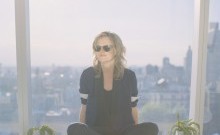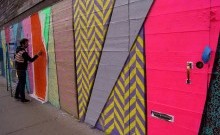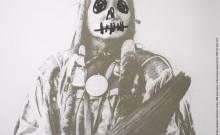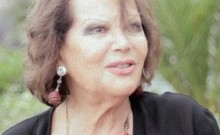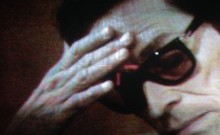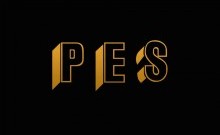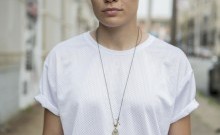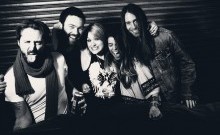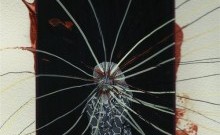Onur Tukel: Lost in the Moment Together
Born in North Carolina of Turkish descent, upon introduction it would give great pause to consider that Onur Tukel was ever not from New York. His career as a director first drew acclaim for Richard's Wedding, a three-act satirical look at the bond of matrimony & friendship over the course of a single day, as a group of New York 20 & 30-somethings converge upon Central Park, for an ill-advised set of nuptials that border on disaster. I first met Onur at a screening of Redlegs (dir. Brandon Harris) when it opened at the now defunct Re-Run Theatre in Dumbo. Richard's Wedding was set to premiere the following week, & we became fast friends. The film was distributed by Factory 25, & brought Onur further acclaim, after years of peddling his performances in such cult-indie classics as Michael Tully's Septien & Alex Karpovsky's Red Flag. Now, with Summer of Blood, a Bushwick set vampire comedy that premiered at Tribeca Film Festival this year, & will open in New York courtesy of MPI this October, just in time for Halloween.
Onur Tukel is a fast-talking, well-spoken, self-deprecating, inexplicably watchable character. His persona carries through to all his creative work, & his contributions to the world of illustration & fine art predates any cinematic offerings. Our conversation took place in his apartment near the JMZ in Bushwick, an apt I once subletted & theretofore can attest as to its veritable lack of both light & ventilation. That only plants that grow in darkness could survive within such a space is telling, & perhaps speaks to the nature of a personality who would create a world within a film in which a night-dwelling streetwalker can still manage to rise during the cold light of day, just as long as he wears his gloves & ski mask.
on Summer of Blood, New York's influence, shooting quickly, & a letting go
EL: So I heard about the project really peripherally at its inception, but I was interested to hear about its origins from you. It seemed like the production & the execution being so streamlined & expedited, the fact that you did it so cheaply & so quickly, that that was something you were continuing from the last project, Richard's Wedding. Would you say that's true?
OT: Yeah, they were both made really quickly. That's what I want to do right now, find a way to just make these things really quickly. In the past, I would spend two years making a film, & get a lot of money from investors ---
EL: This is your film Ding-A-Ling-Less?
OT: Yeah, House of Pancakes, The Pigs, Sergio Lapel is Drawing Blood, & Ding-A-Ling-Less. They were all shot on film, sorry my first three movies were, & they would take a lot of time to get made, like two years, a year & a half, & I just don't want to spend that much time making movies anymore.
EL: It takes too long. Too much of your life.
OT: Right! I agree. It's like, being in New York, I just want to experiment, play with a lot of different things. I think Joe Swanberg, being privy to his movies, made me kind of inspired. You know, he's making movies, in a short period of time, he's not worried about---
EL: Them being perfect?
OT: Right he's not so concerned with the aesthetic of it…
EL: You're into that, the anti-aesthetic aesthetic.
OT: Right, I didn't care about how Summer of Blood looked, & don't get me wrong, I like the craft of film, I love beautiful films, that the technical aspects are well-done, & I would like to actually delve into those, but I'm more interested in acting & performance now. That's where your & my relationship comes from, is me admiring Redlegs, I mean I like the production aspects of that, they're really raw, but it was the performances I really liked. Especially yours.
EL: It's all very barebones. The word that comes to my mind is unregulated.
OT: Right.
EL: It's funny because your stuff, the first stuff I came into contact with, with Richard's Wedding, it seemed improvised, but it didn't seem unregulated so to say. Maybe that had to do with the improvisations being less male & filled with a certain rage that makes them difficult to tone down.
OT: For me what it was, was that when I was making movies on film & not caring so much about the performance, I would storyboard, I would think about the blocking, how the camera worked, all the technical aspects, as opposed to being in the moment & trying to find something really inspired.
EL: The first four films?
OT: Yeah, & when I got to New York, I wanted to take a step back, & I wanted to maintain less control, & just have it be about creating an environment that was really comfortable for actors, so we could get something that was really raw, & really real.
EL: Do you think that was something about being here (NYC)?
OT: I think it was a combination of being here & also just starting to see a lot of movies like Bad Fever by Dustin Defa, being around & making Red Flag with Alex Karpovsky, that was a huge influence on me, just seeing how he worked, & how he would discuss ---
EL: He also works really fast.
OT: Really fast, & really in the moment, & he would just do the scene, go back, reassess what he got, & talk it out with the actors, figure out what they needed next. And for me, the idea of collaborating & talking it out with the actors, that got really exciting for me. And not quite knowing what's going to happen, not quite wanting to know what's going to happen, & also not being in control of the scene so much. So that is unregulated in a lot of ways, but really it's about finding the moment, making sure it feels real, & then we're all just, just lost in the moment together. I don't want to be too in control, I want it to get better & better like it does, the less in control that it gets.
EL: I feel the same way a lot of the time.
OT: Trust is a lot of it too. I used to storyboard, & now I like to trust the DP a little more, trust that he's gonna do it right, that these guys are professionals, & that they are gonna do a good job, that the actors know what they're doing & that they can bring a fresh perspective that I could never have had. You know, I'm just surrounded by so many artisans, why would I need to put my own specific stamp on it, why should it be about me?
EL: Were you in touch with those guys, Joe (Swanberg) & Alex (Karpovsky) & Dustin (Defa), before you came to New York?
OT: Yeah after I came here. New York has a huge influence on me.
EL: It changed the way you wanted to do things. It changes the way you want to do things.
OT: Without a doubt. Even just like, riding the subway. It gives me a sense of community I never had in the South. New York is chaotic, but there is control within that chaos. There's a beauty to it just as it's disgusting. It's magical. I'll be on the subway feeling kind of bad about if I see downtrodden, impoverished people, & then I'll look over & catch someone else's eye & they'll just smile at me, & I'll smile, & it gives you everything you need just to get through the day. It's life-affirming in a way. I'm a pretty reclusive guy, I stay home a lot, but I venture out into the city cause I am in New York, & it inspires something in me about having a family or at least a community in some kind of way. It just really creates something about wanting to be a part of a network. A group. So film for me now has become more of a collective kind of experience, it always has been, but here much moreso, just everyone having something to say & me listening & saying "Yes" a lot more than I would have in the past, & trusting that some people do know more than me, that they do have something to add that might make it better.
EL: Well, if you don't lay down commandments, it allows the performances to have the command in a lot of ways, they have the chance to become timeless & for the ages in a lot of ways, whereas had you dictated them specifically to the person, they might not. . The person could probably have executed your idea sufficiently, but it probably would not have been as comfortable for them as doing it in their way, which might be more beautiful. A lot of times the unpredictable result is much more earth shattering than what you were trying to do in the first place. It's funny because I've had sort of the opposite experience. I think when I've taken risks & let go in the past, I've failed more in the details. And I think that has something to do with the design of the thing, with not understanding the thing enough or being prepared enough in the first place. I've seen inadequacy in the risks, but I've also seen the process of taking chances that are beyond guaranteed success as being worth it. At the same time, it seems like I'm not headed in that direction. Like I actually come from a place of being open, but wanting to head more & more in a direction of more control, all the time. We have a lot in common, but we're pursuing different trajectories.
OT: Well, if I act in a movie & the director wants to give me direction, you can be sure I want to give him that performance that he's asking for. There's no doubt about that.
EL: Right, of course, but at the same time, if the director allows me to take chances, & I take those chances, I can't steer the ship, so I can be disappointed in the end result. So when I'm steering the ship, I've come to realize that I need to be more exacting, & I realize it's the same prism but we come out different sides. We still share the center, the ideal of it.

on cinema's growth with our own aging process, dialogue vs. cinematography, & "the cut"
OT: I'm excited about different things in cinema now than I once was. Craft & technique really don't impress me anymore. I feel like anybody, with the the luxury of time & money, can plan a dolly shot, find the right location, rehearse that shot, make that beauty happen. I still appreciate that, but I’m more excited by two people in a room getting to a place that you've never seen before, cause that's really more beautiful to me than any beautiful shot.
EL: It's interesting because the talking thing, that's fascinating to hear you say man, cause I mean, I go back & rematch stuff I've done all the time, & the talking just seems interminable, insufferable. I just see constantly the amount of cutting being a way of fixing things later, & I just know that every time I see this degree of kinetic, frantic cutting, that it's an effort to disguise the fact that a lot of these words are unnecessary, that if this shot was more beautiful or the silence between these two people was more contained, I would be more engaged, & the people who see it in the future would be more affected as well. And yet your work, specifically your performances, I find across the board just so inexplicably watchable, in spite of the degree of dialogue.
OT: That's really sweet of you to say.
EL: I mean, to me, it is truly inexplicable. I see it, I am sucked into it, truly engaged, but I don't understand it. It doesn't really make a lot of sense to me, because ---
OT: Because it's cinematically flat?
EL: Well, maybe, but not necessarily. It's really more that it's just not as much what I like. I tend to be more drawn towards things that are more about silences then words.
OT: You know me, we know each other, so that's probably why.
EL: I mean, but originally we didn't. I told you that the first time I saw Richard's Wedding.
OT: I think a combination of the two is the ideal. When you can't really pay the actors, & you don't have the time, it's hard to couple interesting performances & dialogue with really beautiful photography & design. I don't like cutting a shot if I don't have to. If I could do a whole scene in one shot, I would. I just saw Happy Christmas [dir. Swanberg] & he does that a lot. It was very assured, because he did all these master takes. I like to shoot with two cameras, shoot for several minutes more than you could with film, do the entire scene without stopping, which I think is really important to the form. I think the cut does subliminally take you out of it.
EL: I was reading this book about The Misfits, the John Huston/Arthur Miller collaboration. And Arthur Miller was speaking from several years later about the picture, & he goes on & on about how because he comes from theatre, he doesn't understand photography's appeal. For him, the story is about the people, the experience should be about the story. And that the reason The Misfits might seem so antique & ornate & prosaic is because it has no sense of what he refers to as "the television style of editing," which is the term he uses to refer to nothing more than a lot of quick cuts, or even cutting back & forth between characters at all. To him, because the film was made in the 1950s, that style of editing didn't exist, & so Huston could never have made the film any other way than a lot of scenes shot in twos & threes. In his mind the film is powerful because it has a resemblance to the theatrical stage, as opposed to painting, which is what cinema is really more akin to.
OT: That's interesting.
EL: Yeah, I mean, when I was first drawn to film, it was about the opposite of that. It was about how that MTV style of editing, the flashiness of it, was gauche & not what I liked or wanted to see. And then as soon as I started trying to make things myself, it seemed like all I was doing was realizing the futility of trying to deny that style's influence on my own sensibilities.
OT: Right.
EL: I remember being like, why the fuck am I doing this? And then realizing: Oh. It's cause I'm cutting around these shots, because these shots weren't designed correctly. It's the difference between crafting the narrative or fixing it later. It's a tug-of-war, & I wonder if you've had to go through that too.
OT: I work with two guys, one of them is Jason Banker, he made a movie called Toad Road, & he comes from a documentary background, so he's all about just finding the moment. Covering the actors, finding the scene, finding the narrative within the things that are just happening naturally. In Richard's Wedding & Summer of Blood, that's how we did it: It got to the point where I didn't even need the DP to read the script, or at least, I didn't even care if he did. Cause I wanted him to come to it fresh, in the moment---
EL: Just like if you invited the performers to the table cold.
OT: Exactly. If I could find a shot that carries through, that's doing amazing things for us, for the movement & the organic fluid nature of the scene, I like to hold that shot. You can contemplate & process the emotion of the scene without there being cuts, cause when the cut occurs, you are more in the process of following the fabric of the story being woven together.
EL: If you hold on something, you're no longer bringing the viewer on a ride.
OT: Exactly. You give the audience time to exist with the characters.
on the topic of an actor's energy, preserving the cinematographer's freedom, communicating with an audience
OT: For me, mainly, I want to preserve an actor's energy as much as possible, so that's another reason why we want to shoot the scene as few times as possible, & also keep the day as short as possible. So that we all have the drive to keep going.
EL: Nothing like realizing you're in the 19th hour & someone is asking you to really give it your all for this one.
OT: Right. The problem with the photography, if I ever experience any problems, is that because the DP doesn't always know what's gonna happen in the scene, he might be focusing on the wrong thing, & then I've got good performances happening off-camera, which is okay, cause you don't always have to see the actor's face, but it's not always good, & in that event, I have to do it more than I would have liked to. Normally, I like to give him as much liberty as possible to be an artist & find the scene with us & shoot it however he wants, but sometimes I can't do that because we'll be there forever & I have to give a specific direction, like “keep an eye on this guy here.” We do a lot of vapid closeups in Summer of Blood, & that's for practical reasons: because I like to see people's lips moving when they talk. I think it helps with communication. I know people that watch movies & always put the subtitles on, because they want to know every word.
EL: That's funny. When I was a kid I had a TV that always had the close-captioning on, & I didn't mind it. I liked examining the discrepancies with the text & what I heard. But when I got older I realized that reading during the display of a narrative frame, particularly in foreign films where I didn't know the language, was kind of a hindrance for me, & put me more at a disadvantage than if I didn't understand anything of what was going on --- I hated the idea of not knowing if a performance was good or not, if a character was to be believed or not because I couldn't aurally understand the dialogue, but had to read it underscored instead. And that I might be missing something in the frame, some inflection or expression or detail, because I was reading.
OT: I definitely don't want to be reading while watching a film.
EL: I feel like it's supposed to be like looking at a painting more than reading a story.
OT: My day job is as a graphic designer, so a lot of the things I'll listen to while I'm working are dialogue driven movies, & some movies that I've seen in the past, they play so differently when you just listen. Some of them play better. But some of them, the performances just aren't as good. Like they don't sound authentic. I think it's helped me as a director & definitely as a writer, cause sometimes you hear it & it just isn't authentic. I can never listen to animated movies, because they sound so unreal, so microphonic, so…
EL: Encapsulated?
OT: Yeah, you can tell the performers aren't even in the fucking room together, they're reading, not even acting with each other… If you are distanced from the artifice of it, from the animation, if you're just listening. I read something about Wes Anderson doing his movie [Fantastic Mr. Fox] practically like that, I haven't seen it ---
EL: Me neither.
OT: ---but that's how you do it.
EL: Once you split the elements up, it just seems to shatter the facade of the building. It's like you focus on the brick, you focus on the mortar, after a little while they stop holding together to create the fabric of the foundation.

on the roots of the image in childhood, designing your frames ahead of time, the problem with dolly-shots
EL: It's funny you should bring that up cause I was gonna ask you about whether or not the illustration came first in your work. I imagine it did.
OT: Oh, drawing? Of course. My first memories are of drawing & getting some kind of adulation at these parties my parents would have in the south --- They're Turkish & Turkish people have people over all the time, Turkish friends, American friends, this was a small southern town---
EL: This was in NC?
OT: Yeah, Taylorsville, NC. When I was probably 5 or 6 growing up, my mother started having a lot of social gatherings, & to this day she still will, she's the kind of person who has friends over for tea twice a day---
EL: It's a very Middle-Eastern thing, a very Mediterranean thing too…
OT: Oh yeah. I think so, just to come over & have cake & olives, throughout the day being visited by friends. So I was obsessed with the movie Jaws when I was 5 or 6 years old, so I would draw a picture of a shark ripping someone apart, & the parents would eat that shit up, & they'd give me 50 cents for a drawing or a dollar for a drawing & you get a lot of encouragement at that age.
EL: So you were a capitalist pig even then?
OT: Yeah at that age, & I would draw naked little men running around…
EL: They paid you for that?
OT: I remember, but memories are elusive… I would draw these pictures & my parents would laugh so hard…
EL: Young Pornographer, Onur Tukel…
OT: It's so funny cause I did stuff like the art in Septien [dir. Michael Tully], & that is influenced by the same ideas. At an early age I was drawing stuff just like what interests me now, like ripped apart flesh, & the hilarity of sexuality. There was this song in the 70s called The Streak [1974, Ray Stevens], & it was a kind of spoken word thing, "Oh yes they called him the Streak…," & it was all about being violated by The Streak, & I loved that song & I would listen to it & draw these pictures. I would draw these pictures constantly, & I storyboarded all my first movies, I would put together these long books of pictures, & it would change, & the DP would talk with me about it.
EL: Just the first four films?
OT: Just those. Not for Richard's Wedding, or Summer of Blood.
EL: That's funny. That's kind of like what James Gray [dir. Little Odessa, We Own the Night, The Yards] told me: he would make these elaborate watercolor storyboards for all his first stuff, & then with Two Lovers he just stopped.
OT: That is funny. If I had a bigger budget & more time, I think I'd get back into it. I think it helps my process, it relaxes me & gets me closer to it, understand a little bit more, & then it takes away the burden of having to explain it more to the DP, if I can just show him the pictures. What I'm thinking about doing on the next movie is really rough kind of storyboards, not for the visual sense, but for actually recording the reading with the actors, & then doing a storyboard cut of the movie, just to get a sense of music cues, & tones, & suspense, & I think that would help. You could do a couple of days work & just get it down on paper & it could make a huge difference.
EL: Just to have the design ahead of time, I feel like that's the direction so many of us are going to have to move in in the future. I know it's what I want. I think it would help all of us, from the films of peers of ours that I've seen. The design is always the thing that's lacking, & I think if we move in that direction, one day, one movie, we're gonna nail it.
OT: Sooner than later.
EL: It has to in some way be a little more controlled, even if we go the way of an even more raw performance or collaboration, there has to be more control.
OT: That's the thing, you can go even more raw in one way, & more controlled in the other, & you have that winning combination of both sides.
EL: Yeah, then the center of the circle is conjoined & you have both sides of the prism meeting again.
OT: That would be fascinating. Sometimes things like a dolly shot can pull me out of a picture honestly, something as classic & designed as that, sometimes it takes away from the film for me. Like a dolly shot alongside a character, moving left to right in the frame, it just seems so fake.
EL: It's nice when you can be compelled by the character & the movement can appear subliminal. When the beauty & the smoothness of it goes unnoticed.
OT: Yeah if you're unaware of it, of course!
EL: If you can project yourself into the engagement process enough to the point where the lexicon & visual grammar becomes more a subtle experience & less about how slick it is.
OT: I think a dolly moving in or pulling out has to do with the natural ways in which our eye sees, but the dolly shot that moves laterally, left to right, it bothers me. I don't know if it's because it doesn't seem natural, I can't really figure it out. Maybe it has to do with the reading thing, I feel like I'm reading again, & I hate that.
the first films, the beginnings of inspiration
EL: So how old were you when you made your first films?
OT: I made House of Pancakes first, I was 24, it was black & white, film, set in one house. It was very much trying to copy what Kevin Smith had done with Clerks. And people can say what they want about Kevin Smith, like he's a bad director sometimes or whatever…
EL: I like some of his stuff actually.
OT: Clerks has some bad performances, but it's a funny fucking script.
EL: I'm actually a big Mallrats fan.
OT: I love that movie.
EL: I think that might be my favorite.
OT: It's insane… But Clerks was all shot in one location, black & white, I was really into that book by John Pierson [Spike, Mike, Slackers & Dykes, 1997], you know he gave money to Spike Lee for his first film She's Gotta Have It, he helped Kevin Smith as well, & I was really influenced by that. So we shot the whole thing in one location, in Wilmington, NC, & we had only one secondary location in the movie, it took place in a convenience store, as a little homage to Clerks. And it had some bad acting, some bad sound, that was the bane of it.
EL: Everyone's.
OT: Now there's no excuse cause it's been so talked about & it's so much easier to do a good job at it than it used to be.
EL: That's why everyone was so taken in by [Andrew] Bujalski's first films [Funny Ha-Ha, 2002 & Mutual Appreciation, 2005], cause there were all these issues with the tone & production values, but the sound was impeccable, so it was still a hermetically sealed, nicely composed experience for those who saw them. People could expect the worlds created in spite of how mind-blowingly rough they were, they almost seemed like non-movies in a way.
OT: I'm a big fan of Beeswax [2009, Bujalski].
EL: I've never seen it.
OT: That's how I met Alex [Karpovsky]. I went to some party for Tiny Furniture that Michael Tully [director Septien, Ping Pong Summer, editor Hammer to Nail] had invited me to & I saw Alex there & I went right up to him & said, "I loved you in Beeswax!" & we became friends in that moment. I'd only been in New York for a few months. Even now I've only been here 4 years.
EL: So you weren't in film school?
OT: No. I studied radio & television at UNC Chapel Hill. And by the end of my junior year I was nervous about not being able to find a job in the industry, & so I switched to having a double major in Journalism. That's where I learned graphic design, which is great cause now I've been able to juggle post production work, editing, graphic design, & filmmaking, & just make a living through all these things.
EL: What were the formative filmmaking experiences for you, films that inspired you? I see such a disparate breadth of subject matter & material & style in all your films, there's a lot of thematically similar running currents, but I'm interested in which films specifically made you want to do this --- when I was staying with you I watched so many movies in your collection, & I remember thinking that based on the films you had, the ones you owned, that if I was a stranger I would not have been able to picture you or what type of person you were, they were all so different.
OT: Well I'm a big Woody Allen fan, but I also love trashy horror films. When I was in my teenage years that's all I watched. When I got to college, it was dialogue driven films, indie films, Woody Allen.
EL: What films?
OT: Barcelona, Metropolitan, Last Days of Disco, Dazed & Confused, Slacker…
EL: I just saw Newton Boys.
OT: Only one I never saw.
EL: It's my favorite.
OT: That's amazing!
EL: It's his most interesting film, by far. Genre to the max. Plus Dwight Yoakam.
OT: When did Sling Blade come out? 96?
EL: Yeah.
OT: That's another thing where [dir. Billy Bob] Thornton would shoot these long things in master shots, & that was really influential for me.
EL: I remember seeing it when I was 13 or 14 & noticing that there were long-takes, no cuts, for the first time ever watching a movie. I couldn't believe there were no close-ups.
OT: The first time I saw Raging Bull, I was 13, actually maybe even 10 or 11, & that was the first time I was blown away by anything so cinematically a tour-de-force, visually. I'd never seen anything, I couldn't believe it, so kinetic & in your face & so incredibly violent & unflinchingly raw… As a young kid seeing that, it was really unbelievable. The thought of Sling Blade, I mean I saw it 20 years ago almost, but I understand that the idea of it makes me cringe now & makes other people cringe now. But if you look back I think it still is very good.
EL: I think part of the reason it is sort of cringe-inducing though is because of his (Thornton's) persona being developed & subsequently degraded in the public eye. I mean, if you limited his output to his first two films that he had a hand in making, which are One False Move & Sling Blade, the guy's a knockout. That's a one two punch from someone who came from a pretty marginal, extremely impoverished upbringing & didn't just settle for that & went to LA to make movies, & made two that are out of the park, by & large.
OT: Carl Franklin made that. He did Devil in a Blue Dress. I love that movie so much! I've watched it so many times…
EL: You didn't say don't kill him, you just said don't shoot him! ... I watched that movie here!
OT: (laughter) That movie's incredible!

on the risk of typecasting, transformative filmmaking, & Jaws' relevance
EL: It's funny because as we keep making films, self-generating these narratives that are I guess sort of sequentially developed from the same themes & contain a lot of characters that are sort of continuations on the same ideas, you can see the trajectory. I wonder if it is as dangerous as it seems to play too much into the comfort zone of that, & risk being expected to do the same thing every time, the same character in every story, to the point of typecasting or becoming an overexposed entity rather than a performer who does something a little different or better every time.
OT: Typecasting seems dangerous to me.
EL: I wonder if it isn't as hard as we think at times to inject a little more diversity into our work, but to still retain our own individuality, & to have that individuality remain consistent in a way that reflects our own contradictions but also allows for people to not exactly hammer you down. My favorite thing about Orson Welles is that he would never let anyone see what he really looked like.
OT: Right, right, he was always made up!
EL: Every fucking movie…
OT: He would get lost in that & allow himself to be fully immersed in the character.
EL: And allow for the audience to forget it was him even though they obviously knew who they were there to watch. There's something in that that's more interesting to me than seeing too much of myself. Can you imagine having an experience like that?
OT: Well it's funny because, maybe it is that simple: Appearance. I've thought about the next thing I do, shaving my beard & wearing contact lenses, even though I like the way I look like this [Ed. note: This is also how Onur is the most recognizable], just so when I look in the mirror I see a different person, you know what I mean?
EL: It's a trip when that happens.
OT: Yeah! When you've looked the same way for a year, two years of your life, you look in the mirror, & you don't recognize yourself? It's funny you mention Orson Welles. I was watching this documentary & there were all these testimonials about him, & everyone said the same thing: He wouldn't shoot until his make-up person had arrived.
EL: The nose, he would never use his own nose.
OT: Is that right?
EL: Yeah that was his thing. He believed it was the most prominent feature in people's perspective because it was in the center of the face. It determined how the eyes look, how everything appeared in perspective. I wonder if that is the way out of pigeonholing ourselves, the more transformative thing.
OT: Well do you consider Orson Welles a character actor? See, I'm just not a character actor, I don't have the skill set, I never learned how to do accents, or different types of personalities, so I'll probably always be stuck, not as an actor, but in terms of performing, performing as an extension of my own personality.
EL: You're utilized in Septien as a "fine artist" character, but besides that, I don't see you in that character.
OT: Really? Well, I'm not really doing anything in that role… I appreciate that…
EL: I like that part because it's quiet, which isn't something I get to see from you so much. Are there things you consider trying, aside from personal appearance, in order to disappear more?
OT: Well there are parts of my personality that people don't see: The things you hide, things that are dark, things I'm afraid of, things I'm ashamed of. Attacking my shame in a movie would be very courageous.
EL: Your shadow. Showing your shadow to somebody can be risky. It's never easy. You feel very degraded.
OT: Yeah. And anger. I put a lot of anger into films but not always the things I'm really angry about. Putting that in a movie, like really just how misanthropic [I can be]… I think about doing that.
EL: In terms of misanthropy, I don't even see it as that sometimes. I get this sense of some kind of strange current of moralistic outrage…
OT: Yeah, you're right…
EL: I get the sense of someone you're playing who just absolutely, resolutely refuses to conform to people's expectations, & that's what people see as being misanthropic or dangerous or abrasive. The scene in Summer of Blood, where you get proposed to at a restaurant & literally try the ring on, take it off, put it back in the box & shake your head "No,” comes to mind.
OT: (laughter)
EL: I mean that is literally the rudest thing in the world I've ever seen, & I loved it. It was just as if “this guy cannot function in the way that people expect of him, no matter what.” And there's something in that abrasion that I admire, whether or not it's the performer doing it or if it's real & a real person, that to me is extremely interesting.
OT: It's going against where we are: The consumer-driven, 9 to 5 work ethic with a white picket fence nuclear family style mentality that terrifies me, that's probably a nice thing because people have a nice, secure life that way, & to have a family is to think about someone else other than yourself, but at the same time, everything driven around “work to buy,” which people are becoming more privy to & realizing that's not a good way to live, I've always kind of rallied against that, I've always sort of been more into the people who are the protesters & the dissenters. More so at least in the 15 years, I mean, George Bush really galvanized a lot of people I think.
EL: It was a formative time for so many of us who were so young when all of that went down… I was 18.
OT: More & more I'm trying to embrace the good things in my life… You know, having a girlfriend, being more social, things that I've always fought…
EL: Yeah you worry you're gonna lose something if you accept the simple pleasures others seem so accustomed to…
OT: Well, the only thing that gets me out of any slump is this (gestures to a new painting): Working on this, I'm in heaven. Doing it, seeing it come together, I don't give a shit what it is, as long as I'm doing something, abso-fucking-lutely. You're contributing to culture, & that's a real thing. A real thing.
EL: The gaps in productivity are the things that cripple you.
OT: For sure. It's better to have these fruitful periods when you're young I think. I had a lull between when I was 30 & 36 or so, & I took a day job at a local TV station. And I was relatively happy there. But I wasn't creating anything for myself. And when I left that job, & felt myself all of a sudden sliding into a depression, that was when the creativity [making these films] became my salvation. I tell you the first movie, I mean, I probably saw Jaws when I was 5 or 6 like 3 or 4 times, & I remember seeing it in the theaters at least once… But I remember that moment when we got cable, when I was 6 years old or so, & I remember that moment when they switched the cable box in, & it all went from static to clear, & I thought it was a miracle. I thought it was like, this is God's grace, because I thought normally TV was just static. And we switched it on, & it was fucking pristine, & I couldn't fucking believe it. I don't know what we had, whether or not we had like 12 channels or something or whatever, but it was like a fucking miracle. I'll never forget the day the cable guy came. But then the motherfucker had an HBO guide on what else was available, & it had Jaws on the cover. And we didn't have HBO, but I started screaming, I threw a fit, "What is this Mom??? You can watch 'Jaws' on TV???!!!" & my mom said yeah, & of course we got it cause I wouldn't shut up about it. And I watched Jaws every time it was on, for the month that it was on, which if you remember what cable was like, was a lot, it was like 18-25 times a week, hundreds of times that month…
EL: Yeah they used to do it like A Christmas Story…
OT: And it's really where all my film sensibilities come from: Jaws is basically two movies. It's first a horror film, you know, a shark's terrorizing everyone on the beach, but the second half, is like a dialogue driven play, on a boat.
EL: You seem to have embraced that kind of motif for a lot of your work: Richard's Wedding is all in two or three locations, & Summer of Blood keeps returning to the same setting of your character in a restaurant with various lovers/victims, interspersed interstitially with these encounters of graphic violence. It's funny to hear you semiotically analyze your own M.O.
OT: Yeah I know, it's all Jaws… And there's not a lot of dialogue technically, but there's these three guys, they're all interesting, different, they're stuck in one setting, which is the boat, in the middle of the ocean, & there's that fucking scene inside which is still one of my favorite scenes in any movie. Ever. And it's that juggling of two different things that I really love: the dialogue driven, character driven story that takes place in one or two locations, & the horror of people's bodies being devoured by this fucking shark.

on vampirism in modern culture, genre filmmaking, Abel Ferrara
EL: We have to talk about the movie since it's coming out. Were you influenced by The Addiction [1997, dir. Abel Ferrara, NYC vampiric bloodlust as drug~metaphor masterpiece]?
OT: I had dinner with Abel in Montreal. And we ate steaks in this restaurant & he talked for over two hours, just with so much anger & vitality about film & everything involved in the industry, still… I'll never forget the tablecloth was made of paper & he was writing on it, drawing arrows, just scribbling all these things to punctuate his points, & in the end, when he got up & left, I'll never forget --- the table cloth looked like some modern-art abstract masterpiece. We all fought over who was gonna take it home, & finally one of the programmers got to take it. I told him, you better put that in a frame!
EL: Have you seen his notebooks? There's no white on the page, it looks completely black from how he never spares a single inch. Covered.
OT: He has some kind of graphomania or something…. Anyway he saw Summer of Blood, & he mentioned to me that he saw something in the pain the character I play experiences when he's going through the sort of hunger pang of needing blood, & he said to me “Man, that's how addiction works… It hurts so bad that's all you can think about…”
EL: It's funny cause there's been such a wash of vampyre driven content & material in the narrative landscape over the last ten years, be it from Twilight, Vampire Diaries, True Blood, Jim Jarmusch's new movie… The list goes on… A lot of people are delving into that culture, there's even a new Dracula coming out now…
OT: The writer of Heathers [Daniel Waters] just came out with a movie called Vampire Academy!
EL: It's everywhere, exactly. It's saturated the culture. But, 10 years before that, Abel was making The Addiction, which is him & Nicholas St. John, & they made something that was analogous to substance abuse & compulsion that is a physical bind you become engulfed in through innocent exploration & experimentation with that substance, with the prism being that of vampyrism. They made a movie about vampires as junkies, hooked on blood. Your film comes along at a time when there's more vampire movies than ever, but yours carries that torch more than fits in with the rest of that crowd: You made a movie about vampires as sex addicts. Plus, your movie is funny, which none of these pictures have. Your movie seemed interested in vampirism as a disease, but a sexual disease, or an addiction, like Abel's movie. You use the genre to talk about something else.
OT: For me, making a genre film was a cheap way of saying: look, how do we make something that is independent & low-budget that has those sensibilities & is trying to argue a point of view? --- the same way that Dustin Defa is trying to say something, the same way that Alex Ross Perry is trying to say something --- how can I articulate something that is my specific point of view, & about the fear of marriage, fear of death, fear of living, this characters afraid of all those things, he's afraid even of just continuing in his current state.
EL: You're talking about something other than what's on the surface, so I'd put it in that same category as Ganja & Hess & The Addiction. Through this obvious template, you find a way of looking at something anew.
OT: Well when he's with these women, he's fucking them, he's biting them, turning them into vampires, obviously there's a sexual metaphor there…
EL: And he's afraid of giving it to his wife.
OT: Well you bind yourself to someone you give somebody a sexual disease. There's this idea out there that that's a reason to stay together, if you share that with someone. I hear that a lot. I don't think it's right. I don't personally… I write from personal experience. And I've personally never had to deal with this idea of dating or not dating someone based on that, what diseases they have or you have. Also, it's a comedy --- & there's a real stigma about talking about this stuff out in the open.
EL: You establish a comfort zone where people are able to laugh at it.
OT: It would be better for people to laugh at it. Whatever doesn't kill you makes you stronger. There might be repercussions to diseases that we haven't even thought of yet. But I didn't want to address it too directly because it makes people squeamish, & there's a shame associated with it that I think is bullshit.
EL: The genre is the envelope you're trying to draw people inside.
OT: The genre is a way to say how many people can we get to see this?
EL: It's the delivery system.
OT: It's a way to streamline our story. And you know, let's make it bloody!
EL: The crazy thing in the movie is how your character seems more alive, when you're part of the undead. And you're attacking people, linking people's blood with yours in these extremely cruise-like situations, on the street at night… Very anonymous, sexualized, violent encounters… It's almost as if once you're deviant, once you're degenerate, you seem less anesthetized.
OT: A lot of my fear, & all my insecurities come from the fact that I don't want to die. I'm afraid to die. And if you knew you were immortal, there's gotta be a bravado that comes with that. When you're younger you don't worry about it as much. If you're unaffected by stress, that kind of idea with youth is you don't think you're gonna die, cause it's so far away. As I get older, I realize I'm gonna die more & more, & I try to live life to its fullest, instead of being castrated by it, paralyzed by it, terrified the whole time.
EL: Doesn't being an immortal seem like more of a prison though?
OT: I think that works out that way with everything. It's the same as being single vs. being married. You don't have to worry about responsibilities when you're single, but you don't have to worry about disease & debauchery's ill-gotten effects when you're married. It's about me living the best life for myself. And I might be better being alone then being with someone. I don't know. I've had bad experiences making films, & good ones. I've had good relationships & bad ones. But at the end of the day, making a horror film, I wanted to make something about what I was afraid of the most.
Summer of Blood is in theaters & available on VOD now.








